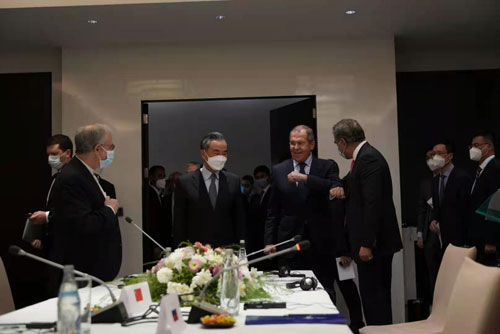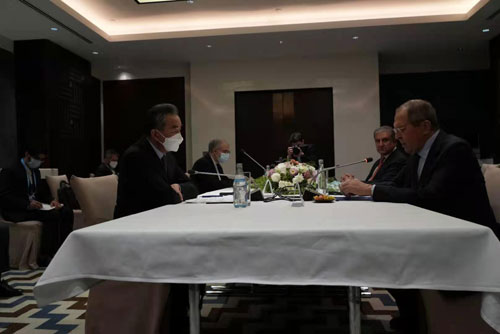| Wang Yi Attends Informal Meeting of China, Russia, Pakistan and Iran on Afghan Issue |
|
|
| 2021-09-17 15:24 |
|
On September 16, 2021 local time, State Councilor and Foreign Minister Wang Yi attended an informal meeting on the Afghan issue with Russian Foreign Minister Sergey Lavrov, Pakistani Foreign Minister Shah Mahmood Qureshi and Assistant to Iranian Foreign Minister Seyed Rasoul Mousavi in Dushanbe. Wang Yi said, before we attend relevant meetings of Shanghai Cooperation Organization together, as important neighbors of Afghanistan and influential countries in the region, it is necessary for us four countries to strengthen communication and coordination, make unanimous voices, exert positive influence, and play a constructive role in the smooth transition of the situation in Afghanistan. Wang Yi pointed out that considering the current situation, Afghanistan is at a critical stage of transition from chaos to governance. The War in Afghanistan has ended, but the Afghan issue remains unresolved. Power politics, military intervention and the so-called "democratic transformation" are the root causes of the current situation in Afghanistan. The hasty withdrawal of the United States and its allies has created new problems in Afghanistan. Afghanistan hasn't finished establishing a new political structure, and faces complex ethnic and religious discords, as well as prominent risks such as local conflicts and livelihood difficulties, which make its future development uncertain. Wang Yi put forward a five-point proposal on the coordination and cooperation among the four countries related to Afghanistan in the next stage: First, urge the United States to earnestly fulfill its obligations and take its responsibility. Together with other like-minded countries, we four countries should urge the United States to learn lessons from the past, shoulder the primary responsibility for Afghanistan's reconstruction, and provide economic, livelihood and humanitarian assistance for Afghanistan, instead of simply shifting the burden onto others and withdrawing from the country with the mess left behind unattended. Second, contact and give guidance to Afghanistan. Although Afghanistan has established an interim government, it has not finalized its domestic and foreign policies. We should, on the premise of truly respecting Afghanistan's sovereignty, independence and territorial integrity and based on the "Afghan-led and Afghan-owned" principle, support the Afghan people in independently choosing their development path, push Afghanistan to establish a broad and inclusive political structure eventually, implement moderate and prudent internal and external policies, pursue friendly relations with neighboring countries, and respect the basic rights of minorities, women and children. Third, guard against the spillover of security risks. The Taliban has repeatedly pledged that it will not allow any force to use the Afghan territory to harm the security interests of its neighbors. We expect the new Afghan government to honor its commitment and make a clean break with terrorist forces, especially resolutely combating those targeting neighboring countries. Fourth, encourage all parties to form synergy to assist Afghanistan. Currently, nearly half of Afghanistan's population lives below the poverty line, 14 million people are facing food crises, and the COVID-19 pandemic has also been underestimated. China will provide emergency humanitarian aid and donate vaccines to the Afghan people. As important neighbors of Afghanistan, we should not only provide urgent assistance to meet its needs, but also encourage regional countries and international organizations to help the Afghan people tide over the difficulties. Fifth, help Afghanistan join in regional cooperation. In the long run, we can, relying on the overall stability and development of the region, help Afghanistan gradually cultivate its capacity for independent and sustainable development and join in the regional economic cooperation and connectivity network to shake off poverty and backwardness and achieve economic development. Wang Yi said, regional countries have three main expectations for the new Afghan government: inclusiveness, counter-terrorism and good-neighborliness. Only with these three characteristics, can Afghanistan build a political foundation for lasting peace and stability, and can regional countries, especially Afghanistan's neighbors, safeguard their legitimate rights and interests. China is ready to step up coordination with Russia, Pakistan, Iran and other countries in the region to play a constructive role in preventing chaos, maintaining stability, combating terrorism and violence, realizing peace and reconstruction of Afghanistan and ultimately achieving lasting peace in the region. All other participants said that the resolution of the Afghan issue requires collective wisdom and efforts. As Afghanistan's neighboring countries, we will be directly affected by the spillover, and it is good for China, Russia, Pakistan and Iran to have full communication on the Afghan issue. We four countries should make unanimous voices, send a consistent and clear signal to the Afghan people, the whole region and even the international community, create a good external environment for the Afghan people to hold the fate in their own hands and push Afghanistan to build an inclusive government of different ethnics and religions. We hope that the Taliban will make a clean break with all terrorist organizations, and we should urge the international community, especially the United States and its allies, to shoulder their due responsibilities for resolving the humanitarian crisis in Afghanistan. The four sides agreed to continue to carry out communication and coordination according to the situation in Afghanistan.
|
| ||||||||||
|
||||||||||
|
|


